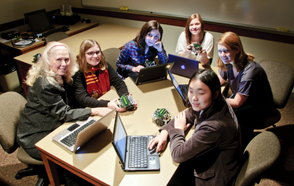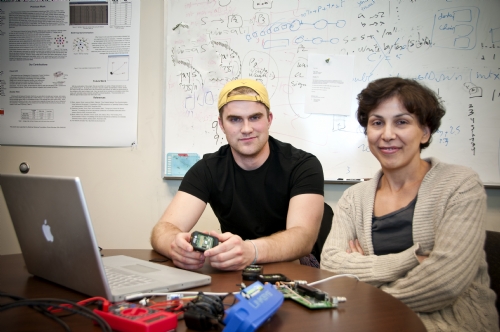Breaking the Silicon Ceiling

Prof. Gloria Townsend and her students.
December 11, 2015
Computer Science Professor Gloria C. Townsend recalls when DePauw students first sat around a Radio Shack computer like children in a reading circle. This was nine years before computer science became an independent department in 1993 – when the importance of technology and computation skills were recognized. At first there were few to no cultural stereotypes about women in computation, but unfortunately, women’s participation declined over the years.
The reason was that “’Big Bang Theory’ stereotypes flooded our culture, allowing influential media portraits to enter our subconscious minds,” according to Professor Townsend. Fortunately, DePauw seems to have found a magic formula to encourage women to major in computer science. In fact, DePauw’s Computer Science Department now has one of the highest percentages of female majors in the nation for undergraduate institutions, and quite possibly the highest.
“There is no discrimination at DePauw, because our Class of 2017 (for example) is 46 percent women. We also believe that this percentage of female majors is the largest in the United States, where the national average of bachelor's degrees awarded to women in pure computer science is only 12 percent,” Professor Townsend says.
DePauw works to create a welcoming environment for female students who might not normally think to try computer science, according to Townsend. For example, each first-year female student receives an email invitation to talk with older students who can become mentors, preview a computer lab, and listen to the opportunities available to them at an event called a content preview. It is also a powerful statement that DePauw has three female professional role models in Khadija J. Stewart (below), associate professor of computer science; Maria L. Schwartzman, instructor of computer science; and Townsend, when many small colleges have none.

Majors can also join the student version of computer science’s professional organization, ACM-W. In this group, students support each other, participate in study tables and reach out to local schools to encourage young female students interested in computer science. However, many women are at first unsure of what careers they can pursue with computing, which is ironic because computer science actually touches all disciplines, and the opportunities span from Web development and consulting to education.
In particular, Professor Townsend cites research that shows ways in which women make better project managers in computing. Businesses would be wise to invest in female project managers because their general strength in teamwork and interpersonal skills helps turn out better products, she says. Those are a few of the many opportunities DePauw’s majors have open to them.
At DePauw, faculty and upperclass student mentors are committed to building a welcoming and encouraging environment for women in computer science, and it appears to be working very well.
Back